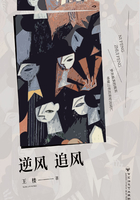THEY went through the Vicus Patricius, along the Viminal to the former Viminal gate, near the plain on which Diocletian afterward built splendid baths. They passed the remains of the wall of Servius Tullius, and through places more and more deserted they reached the Via Nomentana; there, turning to the left, towards the Via Salaria, they found themselves among hills full of sand-pits, and here and there they found graveyards.
Meanwhile it had grown dark completely, and since the moon had not risen yet, it would have been rather difficult for them to find the road were it not that th Christians themselves indicated it, as Chilo foresaw.
In fact, on the right, on the left, and in front, dark forms were evident, making their way carefully toward sandy hollows. Some of these people carried lanterns,—covering them, however, as far as possible with mantles; others, knowing the road better, went in the dark. The trained military eye of Vinicius distinguished, by their movements, younger men from old ones, who walked with canes, and from women,wrapped carefully in long mantles. The highway police, and villagers leaving the city, took those night wanderers, evidently, for laborers, going to sand-pits;or grave-diggers, who at times celebrated ceremonies of their own in the night-time. In proportion, however,as the young patrician and his attendants pushed forward, more and more lanterns gleamed, and the number of persons grew greater. Some of them sang songs in low voices, which to Vinicius seemed filled with sadness. At moments a separate word or a phrase of the song struck his ear, as, for instance, "Awake,thou that sleepest," or "Rise from the dead"; at times,again, the name of Christ was repeated by men and women.
But Vinicius turned slight attention to the words,for it came to his head that one of those dark forms might be Lygia. Some, passing near, said, "Peace be with thee!" or "Glory be to Christ!" but disquiet seized him, and his heart began to beat with more life, for it seemed to him that he heard Lygia's voice. Forms or movements like hers deceived him in the darkness every moment, and only when he had corrected mistakes made repeatedly did he begin to distrust his own eyes.
The way seemed long to him. He knew the neighborhood exactly, but could not fix places in the darkness. Every moment they came to some narrow passage, or piece of wall, or booths, which he did not remember as being in the vicinity of the city. Finally the edge of the moon appeared from behind a mass of clouds, and lighted the place better than dim lanterns.Something from afar began at last to glimmer like a fire, or the flame of a torch. Vinicius turned to Chil
"Is that Ostrianum?" asked he.
Chilo, on whom night, distance from the city, and those ghostlike forms made a deep impression, replied in a voice somewhat uncertain,—"I know not, lord; I have never been in Ostrianum. But they might praise God in some spot nearer the city."
After a while, feeling the need of conversation, and of strengthening his courage, he added,—"They come together like murderers; still they are not permitted to murder, unless that Lygian has deceived me shamefully."
Vinicius, who was thinking of Lygia, was astonished also by the caution and mysteriousness with which her co-religionists assembled to hear their highest priest; hence he said,—"Like all religions, this has its adherents in the midst of us; but the Christians are a Jewish sect. Why do they assemble here, when in the Trans-Tiber there are temples to which the Jews take their offerings in daylight?"
"The Jews, lord, are their bitterest enemies. I have heard that, before the present Caesar's time, it came to war, almost, between Jews and Christians. Those outbreaks forced Claudius Caesar to expell all the Jews, but at present that edict is abolished. The Christians, however, hide themselves from Jews, and from the populace, who, as is known to thee, accuse them of crimes and hate them."
They walked on some time in silence, till Chilo,whose fear increased as he receded from the gates,said,—"When returning from the shop of Euricius, I borrowed a wig from a barber, and have put two beans in my nostrils. They must not recognize me; but if they do, they will not kill me. They are not malignant! They are even very honest. I esteem and love them."
"Do not win them to thyself by premature praises," retorted Vinicius.
They went now into a narrow depression, closed,as it were, by two ditches on the side, over which an aqueduct was thrown in one place. The moon came out from behind clouds, and at the end of the depression they saw a wall, covered thickly with ivy, which looked silvery in the moonlight. That was Ostrianum.Vinicius's heart began to beat now with more vigor.At the gate two quarryrnen took the signs from them.In a moment Vinicius and his attendants were in a rather spacious place enclosed on all sides by a wall.Here and there were separate monuments, and in the centre was the entrance to the hypogeum itself,or crypt. In the lower part of the crypt, beneath the earth, were graves; before the entrance a fountain was playing. But it was evident that no very large number of persons could find room in the hypogeum; hence Vinicius divined without difficulty that the ceremony would take place outside, in the space where a very numerous throng was soon gathered.
As far as the eye could reach, lantern gleamed near lantern, but many of those who came had no light whatever. With the exception of a few uncovered heads, all were hooded, from fear of treason or the cold; and the young patrician thought with alarm that, should they remain thus, he would not be able to recognize Lygia in that crowd and in the dim light.
But all at once, near the crypt, some pitch torches were ignited and put into a little pile. There was more light. After a while the crowd began to sing a certain strange hymn, at first in a low voice, and then louder. Vinicius had never heard such a hymn before. The same yearning which had struck him in the hymns murmured by separate persons on the way to the cemetery, was heard now in that, but with far more distinctness and power; and at last it became as penetrating and immense as if together with the people, the whole cemetery, the hills, the pits, and the region about, had begun to yearn. It might seem,also, that there was in it a certain calling in the night,a certain humble prayer for rescue in wandering and darkness.
Eyes turned upward seemed to see some one far above, there on high, and outstretched hands seemed to implore him to descend. When the hymn ceased,there followed a moment as it were of suspense,—so impressive that Vinicius and his companions looked unwittingly toward the stars, as if in dread that something uncommon would happen, and that some one would really descend to them.
Vinicius had seen a multitude of temples of most various structure in Asia Minor, in Egypt, and in Rome itself; he had become acquainted with a multitude of religions, most varied in character, and had heard many hymns; but here, for the first time, he saw people calling on a divinity with hymns,—not to carry out a fixed ritual, but calling from the bottom of the heart,with the genuine yearning which children might feel for a father or a mother. One had to be blind not to see that those people not merely honored their God, but loved him with the whole soul. Vinicius had not seen the like, so far, in any land, during any ceremony, in any sanctuary; for in Rome and in Greece those who still rendered honor to the gods did so to gain aid for themselves or through fear; but it had not even entered any one's head to love those divinities.
Though his mind was occupied with Lygia, and his attention with seeking her in the crowd, he could not avoid seeing those uncommon and wonderful things which were happening around him. Meanwhile a few more torches were thrown on the fire, which filled th cemetery with ruddy light and darkened the gleam of the lanterns. That moment an old man, wearing a hooded mantle but with a bare head, issued from the hypogeum. This man mounted a stone which lay near the fire
The crowd swayed before him. Voices near Vinicius whispered, "Peter! Peter!" Some knelt, others extended their hands toward him. There followed a silence so deep that one heard every charred particle that dropped from the torches, the distant rattle of wheels on the Via Nomentana, and the sound of wind through the few pines which grew close to the cemetery.
Chilo bent toward Vinicius and whispered,—"This is he! The foremost disciple of Christ-a fisherman!
The old man raised his hand, and with the sign of the cross blessed those present, who fell on their knees simultaneously. Vinicius and his attendants, not wishing to betray themselves, followed the example of others. The young man could not seize his impressions immediately, for it seemed to him that the form which he saw there before him was both simple and uncommon, and, what was more, the uncommonness flowed just from the simplicity. The old man had no mitre on his head, no garland of oak-leaves on his temples, no palm in his hand, no golden tablet on his breast, he wore no white robe embroidered with stars; in a word, he bore no insignia of the kind worn by priests—Oriental, Egyptian, or Greek—or by Roman flamens. And Vinicius was struck by that same difference again which he felt when listening to the Christian hymns; for that "fisherman," too, seemed to him, not like some high priest skilled in ceremonial,but as it were a witness, simple, aged, and immensely venerable, who had journeyed from afar to relate a truth which he had seen, which he had touched, which he believed as he believed in existence, and he had come to love this truth precisely because he believed it. There was in his face, therefore, such a power of convincing as truth itself has. And Vinicius, who had been a sceptic, who did not wish to yield to the charm of the old man, yielded, however, to a certain feverish curiosity to know what would flow from the lips of that companion of the mysterious "Christus," and what that teaching was of which Lygia and Pomponia Graecina were followers.
Meanwhile Peter began to speak, and he spoke from the beginning like a father instructing his children and teaching them how to live. He enjoined on them to renounce excess and luxury, to love poverty, purity of life, and truth, to endure wrongs and persecutions patiently, to obey the government and those placed above them, to guard against treason, deceit, and calumny; finally, to give an example in their own society to each other, and even to pagans.
Vinicius, for whom good was only that which could bring back to him Lygia, and evil everything which stood as a barrier between them, was touched and angered by certain of those counsels. It seemed to him that by enjoining purity and a struggle with desires the old man dared, not only to condemn his love, but to rouse Lygia against him and confirm her in opposition.He understood that if she were in the assembly listening to those words, and if she took them to heart,she must think of him as an enemy of that teaching and an outcast.
Anger seized him at this thought. "What have I heard that is new?" thought he. "Is this the new religion? Every one knows this, every one has heard it. The Cynics enjoined poverty and a restriction of necessities; Socrates enjoined virtue as an old thing and a good one; the first Stoic one meets, even such a one as Seneca, who has five hundred tables of lemon wood, praises moderation, enjoins truth, patience in adversity, endurance in misfortune,—and all that is like stale, mouse-eaten grain; but people do not wish to eat it because it smells of age."
And besides anger, he had a feeling of disappointment, for he expected the discovery of unknown, magic secrets of some kind, and thought that at least he would hear a rhetor astonishing by his eloquence; meanwhile he heard only words which were immensely simple, devoid of every ornament. He was astonished only by the mute attention with which the crowd listened.
But the old man spoke on to those people sunk in listening,—told them to be kind, poor, peaceful, just,and pure; not that they might have peace during life,but that they might live eternally with Christ after death, in such joy and such glory, in such health and delight, as no one on earth had attained at any time.And here Vinicius, though predisposed unfavorably,could not but notice that still there was a difference between the teaching of the old man and that of the Cynics, Stoics, and other philosophers; for they enjoin good and virtue as reasonable, and the only thing practical in life, while he promised immortality, and that not some kind of hapless immortality beneath the earth, in wretchedness, emptiness, and want, but a magnificent life, equal to that of the gods almost. He spoke meanwhile of it as of a thing perfectly certain;hence, in view of such a faith, virtue acquired a value simply measureless, and the misfortunes of this life became incomparably trivial. To suffer temporally for inexhaustible happiness is a thing absolutely different from suffering because such is the order of nature. But the old man said further that virtue and truth should be loved for themselves, since the highest eternal good and the virtue existing before ages is God; whoso therefore loves them loves God, and by that same becomes a cherished child of His.
Vinicius did not understand this well, but he knew previously, from words spoken by Pomponia Graecina to Petronius, that, according to the belief of Christians,God was one and almighty; when, therefore, he heard now again that He is all good and all just, he thought involuntarily that, in presence of such a demiurge,Jupiter, Saturn, Apollo, Juno, Vesta, and Venus would seem like some vain and noisy rabble, in which all were interfering at once, and each on his or her own account.
But the greatest astonishment seized him when the old man declared that God was universal love also; hence he who loves man fulfils God's supreme command. But it is not enough to love men of one's own nation, for the God-man shed his blood for all,and found among pagans such elect of his as Cornelius the Centurion; it is not enough either to love those who do good to us, for Christ forgave the Jews who delivered him to death, and the Roman soldiers who nailed him to the cross, we should not only forgive but love those who injure us, and return them good for evil; it is not enough to love the good, we must love the wicked also, since by love alone is it possible to expel from them evil.
Chilo at these words thought to himself that his work had gone for nothing, that never in the world would Ursus dare to kill Glaucus, either that night or any other night. But he comforted himself at once by another inference from the teaching of the old man;namely, that neither would Glaucus kill him, though he should discover and recognize him.
Vinicius did not think now that there was nothing new in the words of the old man, but with amazement he asked himself: "What kind of God is this, what kind of religion is this, and what kind of people are these?"All that he had just heard could not find place in his head simply. For him all was an unheard-of medley of ideas. He felt that if he wished, for example, to follow that teaching, he would have to place on a burning pile all his thoughts, habits, and character, his whole nature up to that moment, burn them into ashes, and then fill himself with a life altogether different, and an entirely new soul. To him the science or the religion which commanded a Roman to love Parthians, Syrians,Greeks, Egyptians, Gauls, and Britons, to forgive enemies, to return them good for evil, and to love them, seemed madness. At the same time he had a feeling that in that madness itself there was something mightier than all philosophies so far. He thought that because of its madness it was impracticable, but because of its impracticability it was divine. In his soul he rejected it; but he felt that he was parting as if from a field full of spikenard, a kind of intoxicating incense;when a man has once breathed of this he must, as in the land of the lotus-eaters, forget all things else ever after, and yearn for it only.
It seemed to him that there was nothing real in that religion, but that reality in presence of it was so paltry that it deserved not the time for thought. Expanses of some kind, of which hitherto he had not had a suspicion, surrounded him,—certain immensities,certain clouds. That cemetery began to produce on him the impression of a meeting-place for madmen, but also of a place mysterious and awful, in which, as on a mystic bed, something was in progress of birth the like of which had not been in the world so far. He brought before his mind all that, which from the first moment of his speech, the old man had said touching life,truth, love, God; and his thoughts were dazed from the brightness, as the eyes are blinded from lightning flashes which follow each other unceasingly
As is usual with people for whom life has been turned into one single passion, Vinicius thought of all this through the medium of his love for Lygia; and in the light of those flashes he saw one thing distinctly,that if Lygia was in the cemetery, if she confessed that religion, obeyed and felt it, she never could and never would be his mistress.
For the first time, then, since he had made her acquaintance at Aulus's, Vinicius felt that though now he had found her he would not get her. Nothing similar had come to his head so far, and he could not explain it to himself then, for that was not so much an express understanding as a dim feeling of irreparable loss and misfortune. There rose in him an alarm,which was turned soon into a storm of anger against the Christians in general, and against the old man in particular. That fisherman, whom at the first cast of th eye he considered a peasant, now filled him with fear almost, and seemed some mysterious power deciding his fate inexorably and therefore tragically.
The quarrymen again, unobserved, added torches to the fire; the wind ceased to sound in the pines; the flame rose evenly, with a slender point toward the stars, which were twinkling in a clear sky. Having mentioned the death of Christ, the old man talked now of Him only. All held the breath in their breasts, and a silence set in which was deeper than the preceding one, so that it was possible almost to hear the beating of hearts. That man had seen! and he narrated as one in whose memory every moment had been fixed in such a way that were he to close his eyes he would see yet. He told, therefore, how on their return from the Cross he and John had sat two days and nights in the supper-chamber, neither sleeping nor eating, in suffering, in sorrow, in doubt, in alarm, holding their heads in their hands, and thinking that He had died.Oh, how grievous, how grievous that was! The third day had dawned and the light whitened the walls, but he and John were sitting in the chamber, without hope or comfort. How desire for sleep tortured them (for they had spent the night before the Passion without sleep)! They roused themselves then, and began again to lament. But barely had the sun risen when Mary of Magdala, panting, her hair dishevelled, rushed in with the cry, "They have taken away the Lord!" When they heard this, he and John sprang up and ran toward the sepulchre. But John, being younger, arrived first; he saw the place empty, and dared not enter. Only when there were three at the entrance did he, the person now speaking to them, enter, and find on the stone a shirt with a winding sheet; but the body he found not.
Fear fell on them then, because they thought that the priests had borne away Christ, and both returned home in greater grief still. Other disciples came later and raised a lament, now in company, so that the Lord of Hosts might hear them more easily, and now separately and in turn. The spirit died within them, for they had hoped that the Master would redeem Israel,and it was now the third day since his death; hence they did not understand why the Father had deserted the Son, and they preferred not to look at the daylight,but to die, so grievous was the burden.
The remembrance of those terrible moments pressed even then from the eyes of the old man two tears,which were visible by the light of the fire, coursing down his gray beard. His hairless and aged head was shaking, and the voice died in his breast.
"That man is speaking the truth and is weeping over it," said Vinicius in his soul. Sorrow seized by the throat the simple-hearted listeners also. They had heard more than once of Christ's sufferings, and it was known to them that joy succeeded sorrow; but since an apostle who had seen it told this, they wrung their hands under the impression, and sobbed or beat their breasts.
But they calmed themselves gradually, for the wish to hear more gained the mastery. The old man closed his eyes, as if to see distant things more distinctly in his soul, and continued,—"When the disciples had lamented in this way, Mary of Magdala rushed in a second time, crying that she had seen the Lord. Unable to recognize him, she thought him the gardener: but He said, 'Mary!' She cried 'Rabboni!' and fell at his feet. He commanded her to go to the disciples, and vanished. But they, the disciples, did not believe her;and when she wept for joy, some upbraided her, some thought that sorrow had disturbed her mind, for she said, too, that she had seen angels at the grave, but they, running thither a second time, saw the grave empty. Later in the evening appeared Cleopas, who had come with another from Emmaus, and they returned quickly, saying: 'The Lord has indeed risen!'And they discussed with closed doors, out of fear of the Jews. Meanwhile He stood among them, though the doors had made no sound, and when they feared,He said, 'Peace be with you!'
"And I saw Him, as did all, and He was like light,and like the happiness of our hearts, for we believed that He had risen from the dead, and that the seas will dry and the mountains turn to dust, but His glory will not pass.
"After eight days Thomas Didymus put his finger in the Lord's wounds and touched His side; Thomas fell at His feet then, and cried, 'My Lord and my God!''Because thou hast seen me thou hast believed; blessed are they who have not seen and have believed!' said the Lord. And we heard those words, and our eyes looked at Him, for He was among us."
Vinicius listened, and something wonderful took place in him. He forgot for a moment where he was;he began to lose the feeling of reality, of measure,of judgment. He stood in the presence of two impossibilities. He could not believe what the old man said; and he felt that it would be necessary either to be blind or renounce one's own reason, to admit that that man who said "I saw" was lying. There was something in his movements, in his tears, in his whole figure,and in the details of the events which he narrated,which made every suspicion impossible. To Vinicius it seemed at moments that he was dreaming. But round about he saw the silent throng; the odor of lanterns came to his nostrils; at a distance the torches were blazing; and before him on the stone stood an aged man near the grave, with a head trembling somewhat,who, while bearing witness, repeated, "I saw!"
And he narrated to them everything up to the Ascension into heaven. At moments he rested, for he spoke very circumstantially; but it could be felt that each minute detail had fixed itself in his memory,as a thing is fixed in a stone into which it has been engraved. Those who listened to him were seized by ecstasy. They threw back their hoods to hear him better, and not lose a word of those which for them were priceless. It seemed to them that some superhuman power had borne them to Galilee; that they were walking with the disciples through those groves and on those waters; that the cemetery was turned into the lake of Tiberius; that on the bank, in the mist of morning, stood Christ, as he stood when John, looking from the boat, said, "It is the Lord,"and Peter cast himself in to swim, so as to fall the more quickly at the beloved feet. In the faces of those present were evident enthusiasm beyond bounds, oblivion of life, happiness, and love immeasurable. It was clear that during Peter's long narrative some of them had visions. When he began to tell how, at the moment of Ascension, the clouds closed in under the feet of the Saviour, covered Him, and hid Him from the eyes of the Apostles, all heads were raised toward the sky unconsciously, and a moment followed as it were of expectation, as if those people hoped to see Him or as if they hoped that He would descend again from the fields of heaven, and see how the old Apostle was feeding the sheep confided to him, and bless both the flock and him
Rome did not exist for those people, nor did the man Caesar; there were no temples of pagan gods;there was only Christ, who filled the land, the sea, the heavens, and the world.
At the houses scattered here and there along the Via Nomentana, the cocks began to crow, announcing midnight. At that moment Chilo pulled the corner of Vinicius's mantle and whispered,—"Lord, I see Urban over there, not far from the old man, and with him is a maiden."
Vinicius shook himself, as if out of a dream, and,turning in the direction indicated by the Greek, he saw Lygia.















